- Joined
- Aug 15, 2019
- Messages
- 7,493
- Reaction score
- 143
- Points
- 63
Demons A La Mode (E! Online, 1997)
E! Online, april 15th, 1997
by Randee Dawn

Depeche Mode returns from the demons Depeche Mode
With David Gahan's devils finally in check, Depeche Mode tries to get the balance right
Depeche Mode front man David Gahan sits in the nearly empty dining room of a London hotel, stares into his untouched coffee and searches for an answer.
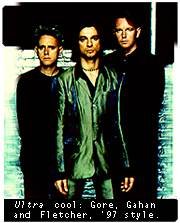 "I don't really understand what I was doing to myself," he says quietly. "I'm really confused about why putting a needle in my arm seemed like the answer to everything."
"I don't really understand what I was doing to myself," he says quietly. "I'm really confused about why putting a needle in my arm seemed like the answer to everything."
Gahan's heroin and cocaine addictions--the twin devils that drove him to repeated overdoses, suicide attempts and run-ins with police over the past few years--are apparently in check now. He's been clean and sober for nearly a year, and although each day remains a struggle, Gahan has rejoined bandmates Martin Gore and Andrew Fletcher for Depeche Mode's first album since 1993, the just released Ultra.
Fans expecting the band's usual tunes about death, doom, loss and sorrow--all shrouded in catchy dance beats and electronic noodling--will not be disappointed. But they may be surprised by the way songs like "Home" and "Barrel of a Gun" resonate in light of Gahan's troubles.
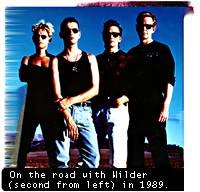 "Martin says he doesn't write songs for me," Gahan says. "But maybe he does. Maybe subconsciously, when Martin is thinking about destiny, he is picturing me. There's this feeling everyone has, the feeling of not being in control of your own life. It was very egotistical of me to think I could control what I was doing to myself. My destiny was taking me to a place where I had no control."
"Martin says he doesn't write songs for me," Gahan says. "But maybe he does. Maybe subconsciously, when Martin is thinking about destiny, he is picturing me. There's this feeling everyone has, the feeling of not being in control of your own life. It was very egotistical of me to think I could control what I was doing to myself. My destiny was taking me to a place where I had no control."
Control didn't seem like such a problem for Depeche Mode in the late '80s and early '90s. On the strength of danceable pop hits like "People Are People," "Personal Jesus" and "Walking in My Shoes," the group sold 15 million albums worldwide, filled stadiums and even lured noted documentary maker D.A. Pennebaker to do their 101 concert film.
But the success and the marathon touring began to weigh heavily. By the time Depeche Mode embarked on a 14-month tour of the United States, things were beginning to unravel, including the departure of longtime member Alan Wilder, who also doubled as the band's producer.
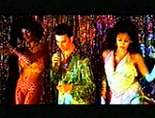 "I think we took on more than we could handle at that stage," Fletcher recalls from a studio at hallowed Abbey Road. "It was too long away from our families, too long together.
"I think we took on more than we could handle at that stage," Fletcher recalls from a studio at hallowed Abbey Road. "It was too long away from our families, too long together.
"Dave was pretty bad at the time. He was sort of engrossed in his habit all the time, and it was like one big party, which does take its toll. All of us were hospitalized during a period in that whole tour, at one stage, for various things."
When the tour stopped, Gahan didn't. He retreated to Los Angeles and continued doing heroin and speedballs. "The scales were tipping way too heavily on 'The Singer from Depeche Mode, Rock Star,' and that kind of lifestyle," he says. "All the cliches, all the trappings--I did them all. And what I was left with in the end was a heroin addiction. I can't remember the last time, at that time, when I picked up a guitar and listened to music. All I wanted was my drugs."
It took two stints in a California rehab center before Gahan felt the cure had taken enough that he could return to London and work on vocals for Ultra--and on repairing the rift within the band caused by years of drug abuse.
As the music for "Uselink" booms from the Abbey Road monitors, songwriter Gore checks a computer visualization of the song and reflects on the band's status. "If we were ever going to break up," he says, "we would have done it after Black Celebration [that 1986 album was the only Depeche Mode offering that failed to find a wide audience].
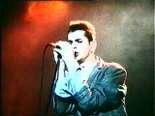 "Since then, I've always felt we were living on borrowed time," he adds. "There's always been this impending-doom scenario hanging over us, which never comes to fruition. We always seem to come through, somehow."
"Since then, I've always felt we were living on borrowed time," he adds. "There's always been this impending-doom scenario hanging over us, which never comes to fruition. We always seem to come through, somehow."
It remains to be seen if Ultra can match the performance of Depeche Mode's previous album, Songs of Faith and Devotion. That disc entered the American charts at number one in 1993, but audiences have changed since then, and the band's momentum may have been derailed by Gahan's difficulties.
That's one of the reasons why Depeche Mode has made an effort to update its sound on Ultra. With Wilder gone, they turned to an outside producer for the first time, longtime friend Tim Simenon. They also used outside musicians (including former Living Colour bassist Doug Wimbish) playing real instruments--another departure for a band so rooted in synthetic sounds.
The result is an album where art imitates life. It takes risks, but at the same time it also sounds like a band trying to take stock of itself and figure out where to go next.
While the light pop edges of Depeche Mode's music have been reshaped on Ultra by the organic sounds of guitars and actual drums, Simenon has brought a harder, industrial edge to the production.
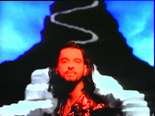 The album looks back and forward simultaneously. "It's No Good" might have been lifted from the band's 1984 breakthrough, Some Great Reward, while "The Love Thieves" has a gentler, more melancholy weariness than Depeche Mode's more grating, harder-edged hits.
The album looks back and forward simultaneously. "It's No Good" might have been lifted from the band's 1984 breakthrough, Some Great Reward, while "The Love Thieves" has a gentler, more melancholy weariness than Depeche Mode's more grating, harder-edged hits.
Then there's "Home," sung by Gore. The final track on the disc, it's a hopeful, almost grateful ballad. ("I want to thank you," run the lyrics, "for bringing me here, for bringing me home.")
Although Gore says he didn't intentionally use the events of the recent past for lyrical inspiration, there's no denying that the words--and even the music--echo Gahan's experiences.
Now standing in the light of sobriety, the once troubled star looks back at the darker days with amazement. "A normal person is able to have a drink or two and say, 'Whoa, I've had enough'," Gahan says. "That was not David. David was 'More, more, more, more' until I didn't have to think or feel anymore. Being straight has enabled me to stop and notice how all the chaos around me was created by me."
From his new vantage point, Gahan is also able to see past the music and the lifestyle to search for the things that are most important to him. "This is what it feels like today, and if I stay on this path, if I stay clean and sober, at least I'll be able to find out what I don't want. It might mean I have to stop everything just to be with David, and to figure out what I want to do with my life."
E! Online, april 15th, 1997
by Randee Dawn
Depeche Mode returns from the demons Depeche Mode
With David Gahan's devils finally in check, Depeche Mode tries to get the balance right
Depeche Mode front man David Gahan sits in the nearly empty dining room of a London hotel, stares into his untouched coffee and searches for an answer.
 "I don't really understand what I was doing to myself," he says quietly. "I'm really confused about why putting a needle in my arm seemed like the answer to everything."
"I don't really understand what I was doing to myself," he says quietly. "I'm really confused about why putting a needle in my arm seemed like the answer to everything."Gahan's heroin and cocaine addictions--the twin devils that drove him to repeated overdoses, suicide attempts and run-ins with police over the past few years--are apparently in check now. He's been clean and sober for nearly a year, and although each day remains a struggle, Gahan has rejoined bandmates Martin Gore and Andrew Fletcher for Depeche Mode's first album since 1993, the just released Ultra.
Fans expecting the band's usual tunes about death, doom, loss and sorrow--all shrouded in catchy dance beats and electronic noodling--will not be disappointed. But they may be surprised by the way songs like "Home" and "Barrel of a Gun" resonate in light of Gahan's troubles.
 "Martin says he doesn't write songs for me," Gahan says. "But maybe he does. Maybe subconsciously, when Martin is thinking about destiny, he is picturing me. There's this feeling everyone has, the feeling of not being in control of your own life. It was very egotistical of me to think I could control what I was doing to myself. My destiny was taking me to a place where I had no control."
"Martin says he doesn't write songs for me," Gahan says. "But maybe he does. Maybe subconsciously, when Martin is thinking about destiny, he is picturing me. There's this feeling everyone has, the feeling of not being in control of your own life. It was very egotistical of me to think I could control what I was doing to myself. My destiny was taking me to a place where I had no control."Control didn't seem like such a problem for Depeche Mode in the late '80s and early '90s. On the strength of danceable pop hits like "People Are People," "Personal Jesus" and "Walking in My Shoes," the group sold 15 million albums worldwide, filled stadiums and even lured noted documentary maker D.A. Pennebaker to do their 101 concert film.
But the success and the marathon touring began to weigh heavily. By the time Depeche Mode embarked on a 14-month tour of the United States, things were beginning to unravel, including the departure of longtime member Alan Wilder, who also doubled as the band's producer.
 "I think we took on more than we could handle at that stage," Fletcher recalls from a studio at hallowed Abbey Road. "It was too long away from our families, too long together.
"I think we took on more than we could handle at that stage," Fletcher recalls from a studio at hallowed Abbey Road. "It was too long away from our families, too long together."Dave was pretty bad at the time. He was sort of engrossed in his habit all the time, and it was like one big party, which does take its toll. All of us were hospitalized during a period in that whole tour, at one stage, for various things."
When the tour stopped, Gahan didn't. He retreated to Los Angeles and continued doing heroin and speedballs. "The scales were tipping way too heavily on 'The Singer from Depeche Mode, Rock Star,' and that kind of lifestyle," he says. "All the cliches, all the trappings--I did them all. And what I was left with in the end was a heroin addiction. I can't remember the last time, at that time, when I picked up a guitar and listened to music. All I wanted was my drugs."
It took two stints in a California rehab center before Gahan felt the cure had taken enough that he could return to London and work on vocals for Ultra--and on repairing the rift within the band caused by years of drug abuse.
As the music for "Uselink" booms from the Abbey Road monitors, songwriter Gore checks a computer visualization of the song and reflects on the band's status. "If we were ever going to break up," he says, "we would have done it after Black Celebration [that 1986 album was the only Depeche Mode offering that failed to find a wide audience].
 "Since then, I've always felt we were living on borrowed time," he adds. "There's always been this impending-doom scenario hanging over us, which never comes to fruition. We always seem to come through, somehow."
"Since then, I've always felt we were living on borrowed time," he adds. "There's always been this impending-doom scenario hanging over us, which never comes to fruition. We always seem to come through, somehow."It remains to be seen if Ultra can match the performance of Depeche Mode's previous album, Songs of Faith and Devotion. That disc entered the American charts at number one in 1993, but audiences have changed since then, and the band's momentum may have been derailed by Gahan's difficulties.
That's one of the reasons why Depeche Mode has made an effort to update its sound on Ultra. With Wilder gone, they turned to an outside producer for the first time, longtime friend Tim Simenon. They also used outside musicians (including former Living Colour bassist Doug Wimbish) playing real instruments--another departure for a band so rooted in synthetic sounds.
The result is an album where art imitates life. It takes risks, but at the same time it also sounds like a band trying to take stock of itself and figure out where to go next.
While the light pop edges of Depeche Mode's music have been reshaped on Ultra by the organic sounds of guitars and actual drums, Simenon has brought a harder, industrial edge to the production.
 The album looks back and forward simultaneously. "It's No Good" might have been lifted from the band's 1984 breakthrough, Some Great Reward, while "The Love Thieves" has a gentler, more melancholy weariness than Depeche Mode's more grating, harder-edged hits.
The album looks back and forward simultaneously. "It's No Good" might have been lifted from the band's 1984 breakthrough, Some Great Reward, while "The Love Thieves" has a gentler, more melancholy weariness than Depeche Mode's more grating, harder-edged hits.Then there's "Home," sung by Gore. The final track on the disc, it's a hopeful, almost grateful ballad. ("I want to thank you," run the lyrics, "for bringing me here, for bringing me home.")
Although Gore says he didn't intentionally use the events of the recent past for lyrical inspiration, there's no denying that the words--and even the music--echo Gahan's experiences.
Now standing in the light of sobriety, the once troubled star looks back at the darker days with amazement. "A normal person is able to have a drink or two and say, 'Whoa, I've had enough'," Gahan says. "That was not David. David was 'More, more, more, more' until I didn't have to think or feel anymore. Being straight has enabled me to stop and notice how all the chaos around me was created by me."
From his new vantage point, Gahan is also able to see past the music and the lifestyle to search for the things that are most important to him. "This is what it feels like today, and if I stay on this path, if I stay clean and sober, at least I'll be able to find out what I don't want. It might mean I have to stop everything just to be with David, and to figure out what I want to do with my life."
Last edited:
